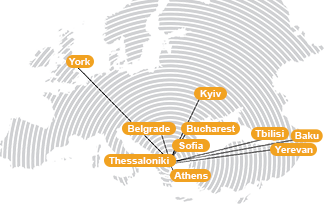This network brings together an exceptionally strong team of world-leading experts from a wide set of beneficiaries and partners in order to achieve breakthroughs in understanding how the transition towards a Circular Economy (CE) can be realised in a successful way in the European context, both within existing organisations and industries as well as through innovative and sustainable business models. The proposed approach is inherently multi-disciplinary, drawing upon research that will advance significantly the state-of-the-art in terms of the current understanding of the applicability of the CE paradigm from Economic, Environmental and Social points of view, providing policy insights and implications for practice. The consortium of 10 beneficiaries (including 7 academic and 3 non-academic groups) will design and deliver world class multidisciplinary training to 15 Early Stage Researchers (ESRs), offering them an extended and valuable program of international exchanges and secondments through the wide network of partner organisations involved in the proposal. The network builds on the success of previous projects in which beneficiaries have successfully delivered high impact research and knowledge exchange. ReTraCE is specifically designed to train a cohort of new thought leaders capable of driving the transition towards a more sustainable mode of production and consumption in Europe in the next decades, who will directly facilitate the implementation of the recently adopted ambitious Circular Economy strategy of the European Commission, which is closely linked to Sustainable Development Goals (SDGs). Indeed, it is envisaged that ESRs will be employable not only by research institutions, but also by public sector bodies and within a wide range of manufacturing and service industries which will require new professional profiles for realising the transition towards the CE.
- RQ1: How can the sustainability of supply chains and production systems be enhanced by implementing initiatives (at micro and meso levels) inspired by the CE concept? What are the main risks and barriers (from both a technological and relational point of view) to the implementation of these initiatives?
- RQ2: What are the environmental implications of circular production systems in terms of energy use, pollution, resource efficiency and waste recovered when compared to a traditional linear production paradigm?
- RQ3: Is the CE paradigm compatible with a context of growth-driven free-market economy? What are the potential dynamics that could arise by the implementation of circular production systems? Who would be the winners and the losers in this transition process? How can the economic efficiency of circular production systems vis-à-vis their socio-economic impact be measured and improved?
- RQ4: What role should be played by central, regional and local governments to enhance the large-scale application along with bottom-up initiatives of such a paradigm in the current European context?
In order to provide a thorough investigation of these research questions, the project will be aimed at formulating a holistic approach for tackling CE issues, bringing together academics from several disciplines (including Supply Chain Management, Environmental Science, Environmental and Ecological Economics, Science and Technology Studies, Innovation Studies) who will train and assist a cohort of carefully selected ESRs. In particular:
- A comparison of linear and circular production systems in critical selected industries (for instance, steel and metals manufacturing; construction materials; electrical and electronic equipment; chemicals and waste management) will be performed, by assessing, through a life-cycle assessment perspective, the performances of alternative systems across a wide range of Triple Bottom Line sustainability indicators (including environmental, social and economic dimensions).
- A critical review of assessment methodologies for measuring the performance of CE systems (based on: Life Cycle Assessment, LCA; Energy and Emergy17 accounting; Life Cycle Costing; Social LCA) will be performed; subsequently, methodological developments will be pursued, in order to overcome the main limitations of existing tools and techniques.
- An overall comprehensive survey and monitoring activity of the presently existing Circular Economy projects at the different levels (company level; supply chain level; regional level), also including an analysis of CE awareness and readiness in European industrial systems, looking at potential diffusion and penetration of CE practices. This will lead to practical and theoretical investigations about the compatibility of CE models with free-market economic contexts, also investigating the applicability and the political implications of CE in growth-oriented economic systems.
- An investigation about policy mechanisms and initiatives needed for favouring the implementation of CE systems will be conducted; also, best practices will be drawn (where possible) from countries in which these systems have been implemented successfully.
Expected Outcomes
- Enhancing the research dissemination, carrier prospects and innovation skills of participants to improve employability and development;
- Contribution to structuring early stage researchers’ (ESR) training at the European level and to strengthen Europe’s innovation capacity;
- Contribution of the non-academic sector to the proposed research training;
- Strengthening Europe’s innovation capacity.






